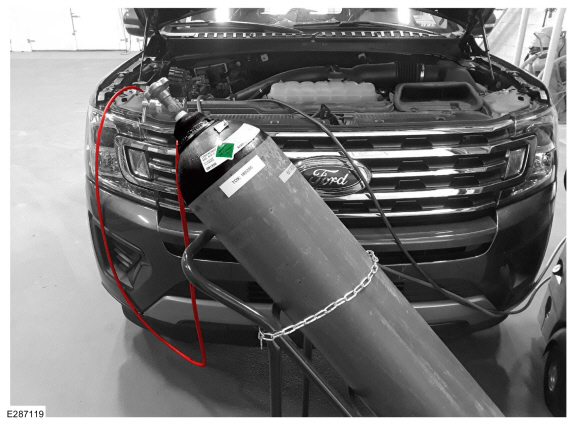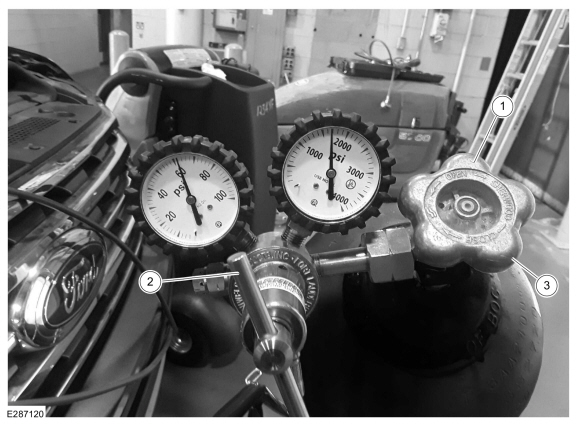Lincoln Nautilus: Climate Control System - General Information / Air Conditioning (A/C) System Leak Test Using Forming Gas. General Procedures
Special Tool(s) / General Equipment
| Forming Gas Pressure Gauge and Leak Detector |
Materials
| Name | Specification |
|---|---|
| Forming Gas | - |
Leak detection
All vehicles
-
NOTE: Use a Rotunda-approved Forming Gas A/C System Dealership Leak Detection Service Kit that meets SAE J2790.
Recover the refrigerant. Refer to the appropriate Recovery procedure in Group 412.
Hybrid\Electric vehicles
-
Electric or Hybrid vehicle with a battery chiller.
It may be necessary to activate the battery chiller(s) to open the
solenoid(s) to allow vacuum and gas to pass through to chiller for leak
testing. Refer to shop manual refrigerant reclaim and charging to see if
solenoid(s) activation is necessary. Follow the shop manual procedure
to perform activation if needed.
All vehicles
-
Perform the vacuum leak test in accordance with the service unit manufacturer instructions.
-
Assemble the gas leak detection kit per manufacturer instructions.
-
Connect the forming gas pressure gauge and leak
detector service hose to the high-pressure port of the air conditioning
system in accordance with the manufacturer instructions.
Use the General Equipment: Forming Gas Pressure Gauge and Leak Detector
Material: Forming Gas
 |
-
NOTICE: Make sure that the pressure reducer (2) is closed.
-
Open the bottle valve.
-
Slowly turn the pressure reducer until a
pressure of 4.1 bar (60 psi) is reached. Maintain open for 30 seconds to
allow tracer gas to fill system.
-
Close the bottle valve.
-
For the correct Model 740KIT - Forming Gas A/C System Dealership Leak Detection Service Kit.
Refer to: Climate Control Tools and Equipment (412-00 Climate Control System - General Information, General Procedures).
-
Open the bottle valve.
 |
-
Leak test the refrigerant system. Follow the
instructions included with the Leak Detector for handling and operation
techniques.
-
For the correct D740 H2/N2 leak detector service tool.
Refer to: Climate Control Tools and Equipment (412-00 Climate Control System - General Information, General Procedures).
-
For the correct D740 H2/N2 leak detector service tool.
-
NOTE: Forming gas is lighter than air, and tends to move up from the source of the leak. It is possible that a leak may not be detected if the leak detector tip is held below the leaking fitting, line or component. Always be sure to thoroughly leak test below, above and around the fitting, line or component.
Disconnect the forming gas pressure gauge and leak detector from the air conditioning system in accordance with the manufacturer instructions.
-
NOTICE: Do not ever recover the forming gas into the A/C recovery/charging machine.
NOTE: Discharge the H2/N2 gas into the atmosphere after the system leak/s are located.
Charge the system with the appropriate refrigerant only after the leak/s are repaired and retested with the H2/N2 gas and the model D740 leak detector. Refer to the appropriate Recharging procedure in Group 412.
 Air Conditioning (A/C) System Flushing. General Procedures
Air Conditioning (A/C) System Flushing. General Procedures
Materials
Name
Specification
Motorcraft® A/C System Flushing SolventYN-23
-
Flushing
NOTICE:
Use the Refrigerant Identification Equipment before
recovering any of the vehicle's refrigerant...
 Air Conditioning (A/C) System Recovery, Evacuation and Charging. General Procedures
Air Conditioning (A/C) System Recovery, Evacuation and Charging. General Procedures
Recovery
NOTICE:
Use an A/C refrigerant analyzer before recovering any of the vehicle's
A/C refrigerant. Failure to do so puts the shop's bulk refrigerant at
risk of contamination...
Other information:
Lincoln Nautilus 2018-2025 Service Manual: Corrosion Prevention. General Procedures
Special Tool(s) / General Equipment Rust Protection Coating Gun Undercoating Gun Materials Name Specification ValuGard™ Premium UndercoatingVG101, VG101A - ValuGard™ Rust InhibitorVG104, VG104A - Motorcraft® Metal Surface Prep WipesZC-31-B - Repair NOTE: Undercoating NOTE: The following illustrations are not vehicle spe..
Lincoln Nautilus 2018-2025 Owners Manual: Autowipers
What Are Autowipers Autowipers turns on and controls the speed and frequency of the windshield wipers. Autowipers Settings Using the instrument cluster controls on the steering wheel, select Settings. Select Vehicle. Select Wipers. Switch Rain Sensing on or off. Note: When you switch the feature off, the wipers do not operate based on the rain sensor. When you switch on the windshield ..
Categories
- Manuals Home
- 1st Generation Nautilus Owners Manual
- 1st Generation Nautilus Service Manual
- Power Outlet - Vehicles With: 110V Power Outlet
- Refueling
- Opening and Closing the Hood
- New on site
- Most important about car
Auto-Start-Stop
What Is Auto-Start-Stop
The system is designed to help reduce fuel consumption and CO2 emissions by stopping the engine when it is idling, for example at traffic lights.
Auto-Start-Stop Precautions
WARNING: Apply the parking brake, shift into park (P), switch the ignition off and remove the key before you leave your vehicle. Failure to follow this instruction could result in personal injury or death.
WARNING: Apply the parking brake, shift into park (P), switch the ignition off and remove the key before you open the hood or have any service or repair work completed. If you do not switch the ignition off, the engine could restart at any time. Failure to follow this instruction could result in personal injury or d
